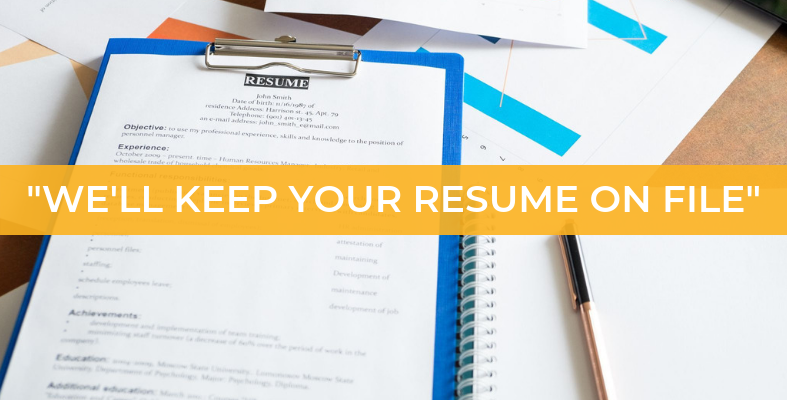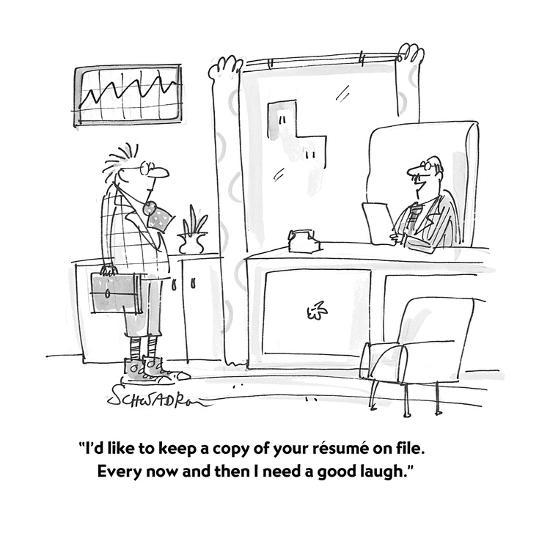
“We’ll Keep Your Resume on File” - What Does This Mean?
Create Job Description Using AI
Write appealing job descriptions for any job opening to attract the most qualifield and suitable candidates. FOR FREE.
try now
When you're interviewing candidates, have you ever told them you'll keep their resume on file? Did you mean it?
I have been rejected a few times during my job search moons ago, but one thing I always noticed is that they always end it with "We'll keep your resume on file." I've always wondered if they actually mean it.
Imagine yourself as an applicant, what does "keep on file" mean? Is it a pile of stacked resumes? Or is it something interviewers say to applicants when they didn't get the job?
So, do employers actually keep resumes on file? Here are three reasons why they might.

Don't be mean like this guy!
Three reasons why interviewers keep resumes on file
Many recruiters and interviewers actually do keep a file of great resumes for future consideration. Here are 3 reasons why:
1. The interviewer likes the applicant, but there's another applicant who they liked more.
Recruiters and interviewers have all had those applicants. You may think of these applicants as the one who got away, even if you're not responsible for choosing who to hire. You'd love to consider them for future openings.
Recruiters often keep these applicants in mind and may contact them when similar positions are open.
2. The interviewer finds the applicant amazing, but not the right fit for the specific position.
Sometimes the unfortunate happens, you find the right applicant but the wrong position. So it's best to keep their resume on file because they had a background in an area you'd need in the future, for example. So, when the job opens, you can just contact them and move forward with the interview process.
3. The interviewer wants to keep the applicant's resume in case the person they hired doesn't work out.
According to a study by Globoforce, 4% of new employees leave their job after a disastrous first day. And 22% of turnover happens in the first 45 days.
Maybe you realise the person you hired isn’t going to work out right away. In any of these situations, you’ll hope you held on to those resumes to keep on file so that you can call your other favourite applicants.
What if interviewers are just saying it just to be nice?
It's not easy to reject applicants. Some find it hard to tell applicants they just didn't get the job. They dislike giving specific reasons and the words “we will keep your application on file” sounds suitable in that situation.
It's easy to say the phrase to end the interview nicely and move on with the hiring process. At least the interviewer is getting back to applicants about not getting the job rather than leaving them wondering for weeks or more.

Post a job with us for only RM175!
What interviewers really mean by “I’ll keep your resume on file.”
Technically, interviewers aren't lying. Some companies have policies where they are required to keep recruiting information such as resumes and applications on file. Many companies are keeping resumes on file, whether or not that candidate is being considered for positions in the future is another question.
Obviously, it depends on the company and the recruiter and the job. But it’s sometimes the exception rather than the rule that those applicants whose resumes are “kept on file” are contacted again.
Be mindful when saying “I’ll keep your resume on file.” Many candidates think that means “Thanks, but no thanks.” But sometimes we do really mean it. Job offers and great employees are often the results!
What does it mean to you?
Do you keep a file with resumes of those “who got away”? Have you had success calling those applicants? Do you mean it when you say it?
Hiring Giving You a Headache? You've found the solution! Register at AJobThing.com to access our recruitment services.
Source: Bamboo HR
Related articles
The Problem with Today's Job Ads
Top Talent, No Skill: Should You Hire Them?
How to Choose the Best Candidate? Resumes are not enough!





